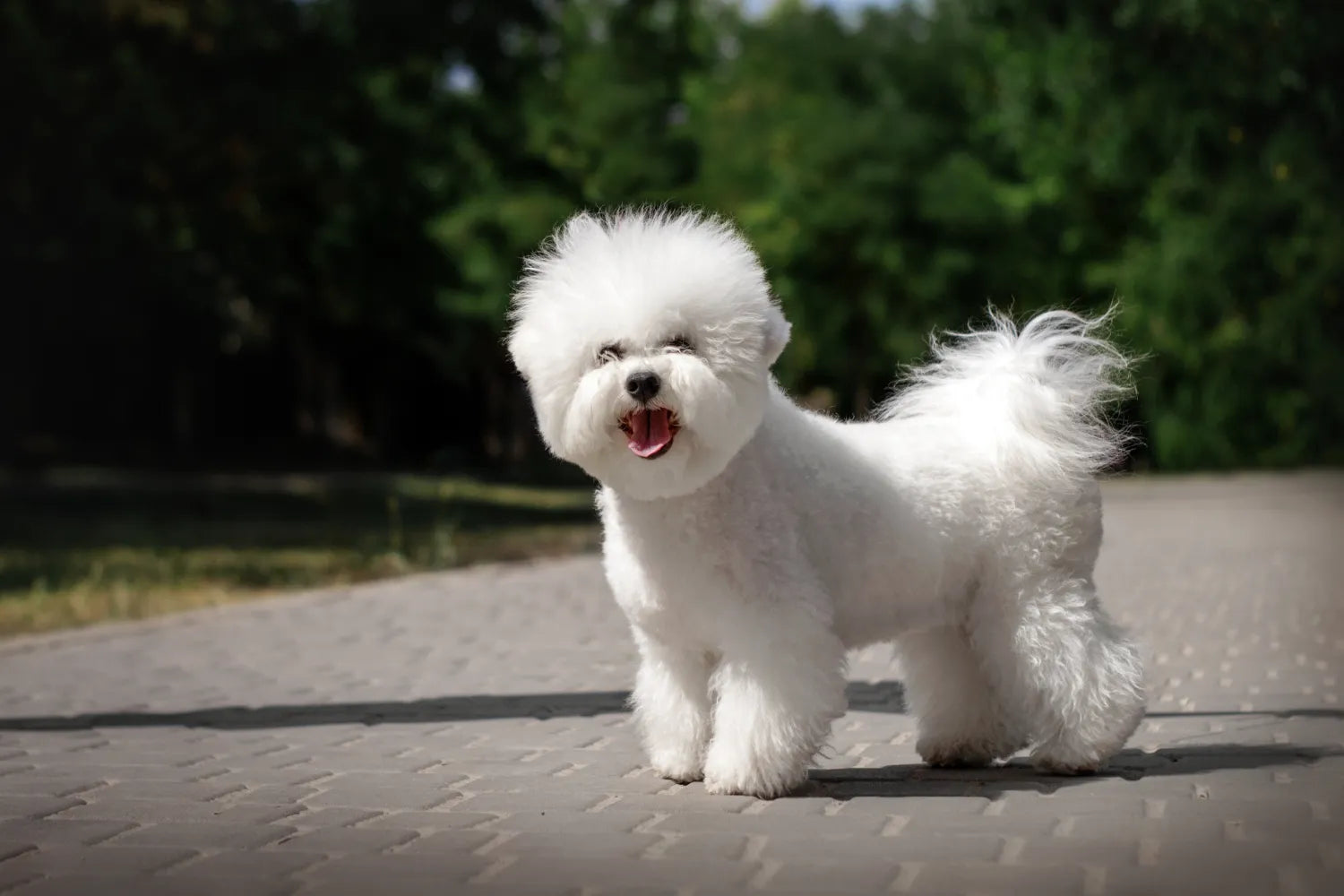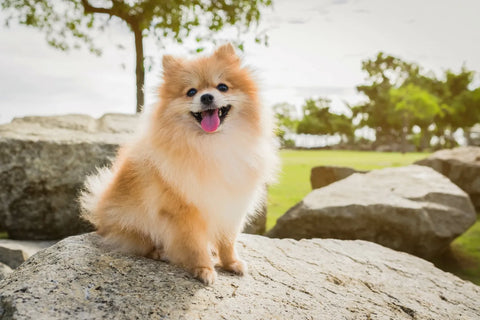
Bichon Frise Personality and Care for Your Pup
Table of Contents
Welcome to the fluffy and joyful world of the Bichon Frise! Here at A Pup Above, we understand the unique bond between dogs and their human families. Our mission is to enrich this relationship with the highest quality, nutritious meals that keep tails wagging.
The Bichon Frise holds a special place in the hearts of dog lovers everywhere. Join us as we dive into what makes these little dogs so beloved and trace their fascinating journey from the Mediterranean shores to our homes.
What Is a Bichon Frise?
A Bichon Frise is a small, sturdy dog known for its merry disposition and distinctive fluffy white coat. This breed is part of a family of dogs called the Barbichon type, which includes other breeds like the Maltese, Bolognese, and Havanese.
Characterized by their soft, curly hair that closely resembles a plush toy, Bichon Frises often have a mix of white and apricot fur. Though they share similarities with the Poodle in appearance and intelligence, their unique charm and personality set them apart.
Bichon Frises are treasured for their affectionate nature, making them perfect companions for a wide range of families.
What Makes the Bichon Frise So Special?
In the realm of small dog breeds, the Bichon Frise shines brightly, capturing the affection of dog enthusiasts around the globe. Beyond their undeniable cuteness, several distinctive qualities set these little dogs apart.
Let's explore the traits that make the Bichon Frise so special:
- Hypoallergenic Undercoat: Ideal for families with allergies, their unique undercoat minimizes the dander that typically triggers allergic reactions.
- Powder Puff Appearance: Their soft, fluffy white coat gives them a distinctive, cuddly appearance reminiscent of a cloud or a well-loved stuffed animal.
- Cheerful Disposition: The Bichon Frise is renowned for its sunny, upbeat personality, bringing a dose of joy and laughter into every home.
- Adaptability: Whether living in a spacious house or a cozy apartment, the Bichon Frise adjusts beautifully to various living environments.
- Intelligence and Trainability: Quick learners and eager to please, these dogs respond well to training, making them both fun and rewarding to teach.
- Energy Level: Don't let their size fool you; Bichon Frises are lively and playful, always ready for a walk or play session.
- Lap Dog Qualities: They epitomize the term "lap dog," seeking out cuddles and comfort from their owners, making them excellent companions.
What Is the History of the Bichon Frise?
The journey of the Bichon Frise from a favorite on the Mediterranean islands to a beloved pet across the globe is a testament to their enduring appeal. The breed evolved from the Barbet or Water Spaniel, leading to their French name "bichon à poil frisé," meaning "curly-haired small dog."
They found favor with Italian sailors in the 14th century, who brought them to Europe, where they quickly became the darlings of French and Italian nobility, including Henry III, who was so smitten with these dogs that he carried them wherever he went in a special basket.
Despite their noble beginnings, the Bichon Frise remained resilient through turbulent times, including the World Wars, maintaining their status as cherished companion dogs. Their enduring spirit and affectionate nature have cemented the Bichon Frise's place in our hearts and homes, making them more than just pets — they're family.
How Can I Care for My Bichon Frise's Health?
Ensuring your Bichon Frise leads a long, happy life starts with understanding and addressing their unique health needs. These delightful little dogs are generally healthy, but like all breeds, they have their share of health issues to watch for.
Here’s how you can keep your dog in tip-top shape:
Regular Vet Check-ups
Annual visits to the vet for check-ups and vaccinations can help catch and manage health issues early. Conditions like patellar luxation, a common knee problem where the kneecap dislodges, and eye conditions like cataracts can be monitored and treated effectively with regular veterinary care.
Dental Hygiene
Daily brushing and regular dental cleanings by a professional can prevent dental diseases, which are common in small breeds.
Grooming
Beyond keeping them looking their best, regular grooming helps prevent skin infections and ear infections. The Bichon's fluffy coat requires daily brushing to prevent kinks and tangles, and their ears need cleaning to avoid buildup that can lead to infections.
Exercise
While they are small, Bichon Frises possess a lively energy level that requires regular exercise to maintain their health and happiness. Short walks and play sessions can help manage their weight and keep their joints healthy.
Mental Stimulation
Their intelligence means they thrive on mental challenges. Training sessions, puzzle toys, and games can keep their minds sharp and prevent boredom.
What Are the Best Nutritional Practices for a Bichon Frise?
At A Pup Above, we're all about ensuring your Bichon Frise enjoys every meal and receives the nourishment needed to thrive. Knowing what's best for your pup's diet is key to their health, happiness, and energy levels.
Here are some tailored nutritional practices we stand by for your Bichon Frise:
- Human-Grade Ingredients: Just as we care about what goes into our meals, we believe your Bichon Frise deserves the same quality. That's why we use only 100% human-grade ingredients, ensuring your pup is eating food that's as good as what you'd put on your own plate.
- Balanced Nutrition: Our recipes, like the Turkey Pawella and Chicka Chicka Bow Wow, are crafted to meet the specific nutritional needs of small breeds like your Bichon. They're packed with the right balance of protein, fats, and carbohydrates to support their energy levels and overall health.
- Grain-Inclusive Options: Every Bichon Frise is unique, and some may thrive on grain-inclusive diets. Our variety includes options with wholesome grains that provide essential fiber, supporting healthy digestion.
- Special Attention to Portion Sizes: Small breeds like the Bichon Frise can quickly gain weight if overfed. We provide clear feeding guidelines for our meals, helping you manage portion sizes to maintain your pup's ideal weight.
- Inclusion of Superfoods: Our high-quality meals are enhanced with superfoods like turmeric, thyme, and parsley. These ingredients are chosen for their natural properties that support joint health, immune function, and digestion, which are vital for the well-being of your Bichon Frise.
Bichon Frise Feeding Chart
Now that you've got the scoop on the best nutritional practices for your Bichon Frise, let's dive into how much to feed them, how often, and what kind of goodies you can offer to keep that tail wagging with joy!
Feeding Guide by Life Stage:
Bichon Frise Puppy
- Diet Needs: Puppyhood is all about growth and play, so high-quality puppy food rich in nutrients like calcium and omega-3 fatty acids is the way to go. These help build strong bones and a silky coat.
- Amount of Food: Generally, your fluffy bundle will need about ¼ to ½ cup of food per meal, served three times a day.
- Snack Time: Puppies love treats! For ideas on what’s safe and healthy, have a read through our article on How to Feed Your New Puppy.
Adult Bichon Frise
- Diet Transition: As your Bichon matures, gradually shift to adult dog food, which should be rich in high-quality protein to maintain their muscle tone and energy levels. Whether you choose dry dog food, fresh food, or wet food, avoid those with fillers or additives.
- How Much To Feed: An adult Bichon usually thrives on about ½ to 1 cup of food per day, divided into two meals, depending on their activity level and body condition.
- Tasty Extras: Adult dogs also enjoy variety. Spice up their mealtime with some safe fruits and veggies. Don’t miss our article on What Fruits Are Good For Dogs? for some juicy options!
Senior Bichon Frise
- Keep It Balanced: Senior dogs might need fewer calories, but their need for quality ingredients with low preservatives remains. Consider food with fish oil and glucosamine to support their joints and coat.
- Portion Control: Monitor their food intake to maintain ideal weight; seniors tend to be less active. Adjust their diet to prevent obesity and manage any health problems like bladder stones or sensitivities.
Essential Tips for a Happy Bichon Frise
Caring for a Bichon Frise goes beyond meeting their health and nutritional needs. Creating an environment where your Bichon Frise can flourish involves understanding and catering to their emotional and physical requirements.
Here are essential tips to ensure your Bichon Frise lives a fulfilled life:
Maintaining Their Coat
The luxurious double coat of a Bichon Frise, consisting of a soft undercoat and a curly outer coat, requires regular attention. Scheduling frequent grooming sessions with a professional groomer will keep their coat in pristine condition, preventing mats and keeping them comfortable.
Preventing Separation Anxiety
Bichon Frises thrive on companionship and can develop separation anxiety if left alone for long periods. Create a warm, inviting space with plenty of toys, and consider a doggy daycare or sitter to keep them company when you're away.
Conclusion
At A Pup Above, we understand that your Bichon Frise is a cherished member of your family. That's why we're dedicated to providing meals that satisfy their taste buds and nourish their bodies, supporting their health and vitality at every stage of life.
Remember, caring for your Bichon involves a blend of love, attention, proper nutrition, and understanding their unique breed characteristics and exercise needs. By following these tips, you're ensuring your Bichon Frise enjoys a happy, healthy life filled with joy and companionship.
Here's to many wonderful years with your fluffy friend, filled with love, play, and lots of cuddles.
Sources:
Bichon Frise Dog Breed Information | American Kennel Club (AKC)
History | Bichon Frise Club of America
Top Stories

Why Do Dogs Lick Their Paws?

Why Do Dogs Whimper & Make Noises in Their Sleep?

Healthy Vet-Approved Homemade Dog Food Recipes

How To Cook Sweet Potatoes for Dogs






















